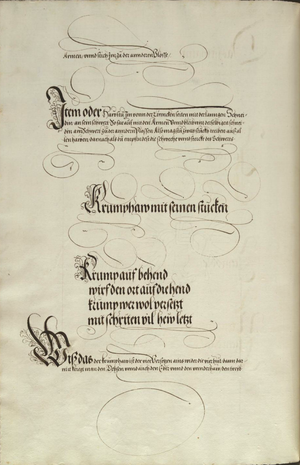|
|
You are not currently logged in. Are you accessing the unsecure (http) portal? Click here to switch to the secure portal. |
Difference between revisions of "User:Kendra Brown/Latin Lew/84r"
Jump to navigation
Jump to search
Kendra Brown (talk | contribs) (→84r c) |
Kendra Brown (talk | contribs) |
||
| Line 110: | Line 110: | ||
=== 84r c English (Sandbox) === | === 84r c English (Sandbox) === | ||
| − | # '''The strike which is called curved,''' a description of its application | + | # '''The strike which is called curved,''' a description of its application to all aspects of the art |
#: | #: | ||
# Now the strike which is recalled to mind is first from the four deflections, | # Now the strike which is recalled to mind is first from the four deflections, | ||
Revision as of 19:33, 12 July 2022
Munich 84r / PDF page 13
84r a
84r a Latin (Sandbox)
- Mutationum is usus est.
- Cum versus hostem de humero dextro tuo acriter ferias è supernis,
- isque tuum inpetum excipiat[^1],
- neque fortiter ensem teneat,
- tum sursum ensis tui aciem brevem iuxta ipsius ensem flectas,
- inde brachijs sublatis,
- mucronem superne super ipsius ense ingeras,
- pòst alteram nuditatem pungito.
84r a English (Sandbox)
- HE has need of the transformations.
- When you strike toward the enemy fiercely from above from your right shoulder,
- and HE would intercept your attack,
- and would not hold the sword strongly,
- then weave the short edge of your sword around up next to his sword[;]
- thenceforth (the arms having been lifted)
- you should thrust the sword from above on top of his sword
- then prick at the other opening.
84r a notes
- [^1]: excipiat is the equivalent for 'versetzt er'
- usus est is a special construction describing need. example with some explanation
84r b
84r b Latin (Sandbox)
- Sin autem Ictum ex latere sinistro formaris,
- aciemq[ue] longam eius ensi adiunxeris,
- brachijs levatis,
- eam aciem ab ense adversarij non removeas,
- ad inferiorem nuditate[m] sauciandum,
- eaq[ue] ratione duos habitus poteris exercere ex omnibus Ictibus p[re]scriptis,
- iuxta observationem,
- num hostis firmiter vel minus ensem teneat.
84r b English (Sandbox)
- But if, however, you formed a Strike from the left side,
- and you connected with his long edge using [your] sword,
- (the arms having been raised)
- [then] don't shift that edge back from the sword of the adversary,
- toward the lower openings that have been wounded;
- and you can employ two skills from all of the previously described Strikes using this method,
- immediately following the observation,
- whether the enemy holds the sword strongly or less [strongly].
84r b Notes
- parallel phrase, present in german (equivalent but not exact)
Missing Zettel verse from Dresden 89v (16)
German
- Krump auf behend
- wirf den ort auf die hend
- krump wer wol versetzt
- mit Schriten vil hew letzt
English (Garber)
- Crooked [cut] quickly upward
- Throw the point at the hands [on top of the hands].
- Crooked cut. Whoever counter acts well
- with many steps allows cuts [cuts last?]
English (Fritz)
- Krump upwards nimbly,
- throw the point onto the hands.
- He who displaces well with Krump,
- will wound many strikes with steps.
[Yeah, I cannot follow his last line]
84r c
84r c Latin (Sandbox)
- Ictus, qui curvus[?] dicit[ur] descriptio adhibitis omnibus eius habitibus.
- Ictus iam co[m]memoratus ex quatuor remotionibus[^2] unus est,
- contra quatuor custodias,
- hoc etiam habitu ictus qui à furore boum et aprorum appellationem accepit,
- debellantur,
- atq[ue] ictum inferum hoc modo exercebis.
- Si in conspectum adversarij processeris,
- et is contra te consistat ensem pro capite in custodia bovis ex latere sinistro tenens,
- tum sinistrum tu pr[a]eponas,
- iuxtaq[ue] humerum dextrum ensem contineas in custodia,
- verum ex ea in latus dextrum prosilias,
- et man[us] hostis acie longa saucies ex brachijs cancellatis.
84r c English (Sandbox)
- The strike which is called curved, a description of its application to all aspects of the art
- Now the strike which is recalled to mind is first from the four deflections,
- against the four guards,
- in addition, this receives the strikes that use the gesture/posture which takes its name from the raging of the ox and the wild boar,
- [and] they are vanquished,
- as well as the lower strike[,] you will employ it in this way.
- If you proceed into range of the adversary,
- and HE stands against you holding the sword before [his] head in the ox guard from his left side,
- then you place the left in front,
- holding your sword next to your right arm in the guard,
- truly you leap forth from this into the right side,
- and you wound the hands of the enemy with the long edge from crossed arms.
84r c Notes
- [^2]: remotionibus is the equivalent of the 'vier versetzen'

